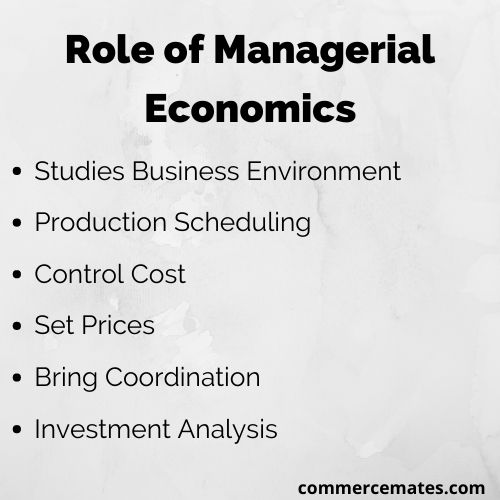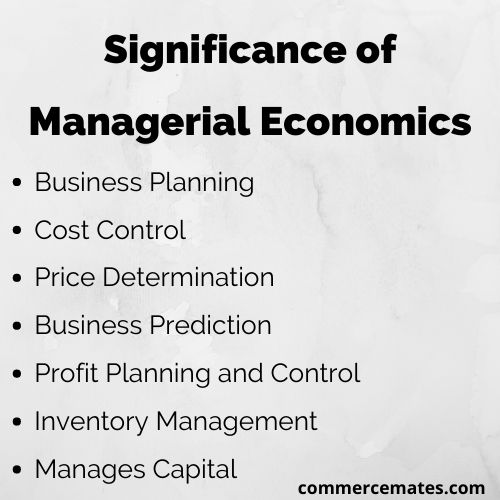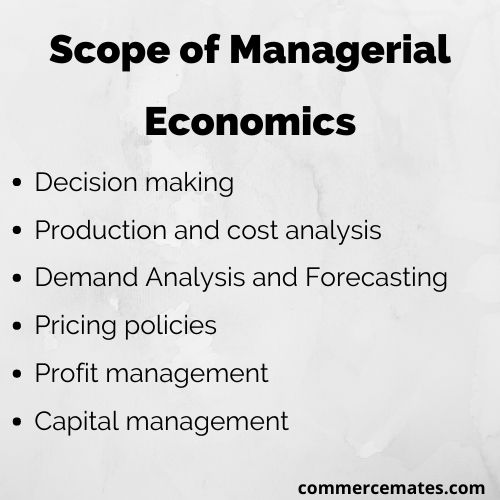Contents
Meaning of Managerial Economics
Managerial economics refers to the management of business using economic theories, tools, and concepts. It is simply the amalgamation of management principles and economic theories for better problem solving and decision making. It is a branch of economics that applies economic theories for analysis, assumption, and prediction of business conditions.
Managerial economics bridges the gap between economics in theory and economics in practice. It assists the managers in logically solving business problems and rational decision making. The key function of managerial economics is efficient decision making and chooses the most suitable action out of two or more alternatives. It monitors and ensures that all scarce resources like labor, capital, land, etc. are properly utilized to derive better results.
Managerial economics performs three important roles for business organizations: Demand analysis and forecasting, capital management and profit management. Firms with the application of managerial economics optimally decide what to produce, how to produce and for whom to produce.
Role of Managerial Economics

- Studies Business Environment: Managerial economics properly analyze the external environment within which the business operates. These factors influence the working of the business and therefore should be considered while taking any decisions and framing policies. Managerial economic studies all factors like economic scenario, government policies, price trends, national income growth, etc.
- Production Scheduling: Managerial economics manages and prepare schedules for all production activities of business. It estimates all future demands using various quantitative tools which helps in making production plans.
- Control Cost: Controlling the cost is vital for achieving the desired profitability and growth. Managerial economics estimates the cost of all business activities and identify all those factors that cause variations in cost from time to time. It aims at minimizing the cost through optimum utilization of all resources.
- Set Prices: Setting the right price is a very challenging task for every business organization. Managerial economics helps management in fixing the correct price by supplying all information regarding competitors pricing methods.
- Bring Coordination: Managerial economics brings coordination and flexibility in all operations of the business. It supports effective decision making by providing all relevant data using economic theories and tools.
- Investment Analysis: Managerial economics ensures that all business funds are allocated to profitable means. It properly analyzes the profitability of all investment avenues before investing any amount into it.
Importance of Managerial Economics

- Business Planning and Forecasting: Managerial economics plays an efficient role in formulating business policies by forecasting future demands and uncertainties. It assists in the effective decision making of an organization by supplying all information using economic tools and techniques.
- Analyze Cost and Production level: Managerial economics focuses on minimizing the cost of business. It determines the cost associated with different business processes and finds out the cost-minimizing level of output. Managerial economics enables business managers in ensuring that there is no resource wastage which reduces the overall cost.
- Formulate pricing policies: It helps in determining the right pricing policies for organizations. Pricing method affects the profitability and revenue of the business organization and therefore fixing the right price is essential. Managerial economics analyses the market pricing structure and strategies for deciding the firm prices.
- Manages profit: Managerial economics monitor and control the profitability of the business organization. Profit is the ultimate goal of every business and determines its success or growth. It ensures that the desired profit is earned by making an estimate of the revenue and expenses of an organization at different levels of outputs.
- Capital Management: Capital management is one of the important functions played by managerial economics. It manages and analyses all capital expenditures of business which involves huge expenditures. Before investing any amount anywhere it measures the profitability of such a source for allocating funds.
Significance of Managerial Economics

- Business Planning : Managerial economics assists business organizations in formulating plans and better decision making. It helps in analyzing the demand and forecasting future business activities.
- Cost Control: Controlling the cost is another important role played by managerial economics. It properly analyses and decides production activities and the cost associated with them. Managerial economics ensure that all resources are efficiently utilized which reduces the overall cost.
- Price Determination: Setting the right price is one of the key decisions to be taken by every business organization. Managerial economics supplies all relevant data to managers for deciding the right prices for products.
- Business Prediction: Managerial economics through the application of various economic tools and theories helps managers in predicting various future uncertainties. Timely detection of uncertainties helps in taking all possible steps to avoid them.
- Profit Planning And Control: Managerial economics enables in planning and managing the profit of the business. It makes an accurate estimate of all cost and revenue which helps in earning the desired profit.
- Inventory Management: Proper management of inventory is a must for ensuring the continuity of business activities. It helps in analyzing the demand and accordingly, production activities are performed. Managers can arrange and ensure that the proper quantity of inventory is always available within the business organization.
- Manages Capital: Managerial economics helps in taking all decisions relating to the firm’s capital. It properly analyses investment avenues before investing any amount into it to ensure the profitability of an investment.
Nature of Managerial Economics

- Art and Science: Managerial economics is termed as both art and science. The application of managerial economics in decision making requires creativity and lots of analytical thinking. It is regarded as science as it uses various economic theories and concepts for managing business and solving problems.
- Management oriented: Managerial economics is a management-oriented concept. It helps the management in rational decision making and solving all business problems logically by supplying all relevant information.
- Multi-disciplinary: Managerial economics is multidisciplinary in nature. It uses principles and theories from various subjects like economics, finance, statistics, marketing, accounting, mathematics, human resource, etc.
- Close to Micro Economics: Managerial economics analyses and solves problems of a particular firm or organization only but not of the whole economy. It focuses on individual units of the economy and provides optimum solutions for facing problems.
- Uses Macro Economics: Managerial economics properly studies macro or external environment within which business operates for better management of the business. It analyses different external factors that affect the business organization like economy state, government policies, market conditions, etc.
- Prescriptive discipline: Managerial economics defines course of action for business for attaining goals and objectives. It chooses the best option among all alternatives available for solving the problems.
- Conceptual: Managerial economics is conceptual in nature as it is based on economic theories and concepts. It does not work on an arbitrary collection of prescriptions but analyze all business problems on the basis of well-established economic concepts.
Scope of Managerial Economics

- Decision making: Managerial economics helps business organizations in taking effective decisions. It tells how management can use various quantitative tools and economic theories for formulating policies and various managerial decisions.
- Production and cost analysis: It helps in estimating the cost of production and determines factors causing variations in cost estimates. Managerial economics properly analyses and decides production activities and costs associated with them. It ensures that all resources are efficiently utilized which reduces the overall cost.
- Demand Analysis and Forecasting: Managerial economics enables the business in analyzing demand and forecasting future uncertainties. An accurate estimate of demand will help in preparing the right production schedules and employing resources accordingly.
- Pricing policies: Pricing is one of the key decisions to be taken by every business organization for earning the desired profits and attaining desired growth. Managerial economics supplies all relevant data to managers for deciding the right prices for products. Key aspects covered under this area are Pricing methods, product-line pricing, differential pricing, and price determination in various market forms.
- Profit management: Managerial economics helps in managing the profit of business organizations. Profit is the main measure for the success or growth of firm in the long run. It helps in making correct estimates of all cost and revenue at different levels of outputs which helps in earning the desired profit.
- Capital management: Capital investment decisions is one of the most challenging and complex tasks before every manager. Managerial economics helps in planning and managing all capital expenditures of business which requires huge investment. It properly analyses investment avenues before investing any amount into it to ensure the profitability of an investment.